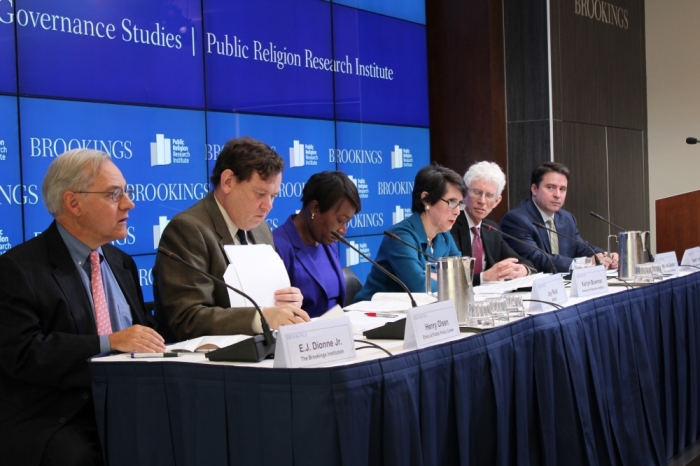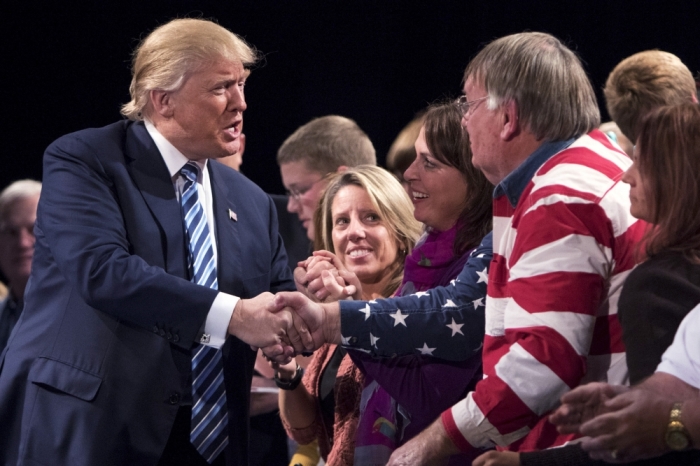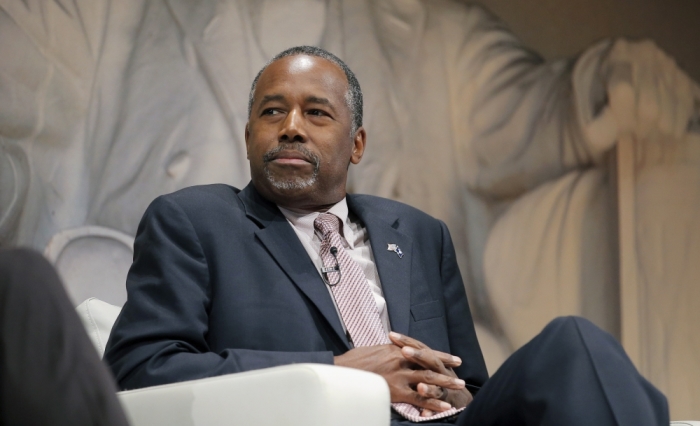White Evangelical Protestants Favor Ben Carson, Survey Finds
Trump Deemed Most 'Unfavorable' GOP Candidate

WASHINGTON — White Evangelical Protestants favor retired neurosurgeon Ben Carson more than any other Republican presidential candidate and find billionaire Donald Trump to be the most unfavorable, a newly released nonpartisan survey has found.
The Public Religion Research Institute, a non-profit, non-partisan, Washington-based research firm that focuses on religion and public life, released its 2015 American Values Survey on Tuesday at the Brookings Institution. The survey included a supplement survey that features data from 1,010 nationwide respondents who were interviewed from Nov. 6 until Nov. 10 on their opinions of the presidential candidates.
According to the survey, Carson has the most support among the likely Republican voters with 27 percent. Trump received the second-most support from likely GOP voters with 20 percent, while former Florida Gov. Jeb Bush and Florida Sen. Marco Rubio received 9 and 8 percent of the support, respectively.
When asked about the favorability of the presidential candidates, 69 percent of Republican respondents (234 in total), said they hold a "favorable" view of Carson, while 55 percent of Republicans said they hold favorable view of Rubio. Fifty-two percent of Republicans hold favorable views toward Bush and Trump.

Although the survey, which has a margin of error of +/- 2.6 percentage points, finds that the majority of Republicans hold favorable views of Trump and Bush, the survey found that 52 percent of white Evangelical Protestants (171 in total), hold unfavorable opinions of Trump and 47 percent hold an unfavorable view of Bush.
Only 39 percent of white Evangelical respondents said they hold a favorable view of Trump, while 41 percent hold a favorable view of Bush.
White Evangelical Protestants favor Carson the most, as 55 percent say that they hold a favorable view of the 64-year-old retired doctor. Twenty-six percent of white Evangelicals said they hold an unfavorable view of Carson.
The white Evangelical Protestant opinions of Texas Sen. Ted Cruz are largely split, according to the survey.
Thirty-one percent of white Evangelicals said they hold a favorable view of Cruz, while 32 percent said they hold and unfavorable view of the senator. Nearly a quarter of white Evangelical Protestant respondents said they have not heard of Cruz, and about 14 percent said they do not know what their opinion of him is.
The American Values Survey, which interviewed 2,695 bilingual respondents, measured attitudinal differences among various demographic groups in the U.S. and found that white Evangelical Protestants and white Mainline Protestants tend to have a more pessimistic view about the direction the United States is heading.
Six out of 10 white Evangelical Protestants and 55 percent of white Mainline Protestants believe that "America's best days are behind us." By contrast, 56 percent of Catholics, 57 percent of black Protestants and 58 percent of religiously unaffiliated Americans believe that America's best days are yet to come.
Henry Olsen, a senior fellow at the Ethics and Public Policy Center, participated in a panel discussion during the survey's release at the Brookings Institution on Tuesday, and explained that white Evangelical Protestants and members of the white working class are inclined to say that America's best days are in the past because society has shifted so much in the last 50 years that popular culture now conflicts with their values.
"Think about the Flintstones. This was a working class family that was considered to be an average family with virtues that were respected. I don't think you would go to the white working class neighborhoods now and consider their virtues as worthy of respect in a popular culture," Olsen said. "This, in a sense, is similar to white Evangelical Protestants. There are a whole lot of theological questions. … If you go back to 1955, you would see that virtually every cultural indicator that they care about was more on their side."
"Both sides, white Evangelical Protestants and the white working class, has seen a massive decline in their public influence and respect of their views in the public square," Olsen continued. "It is no wonder than that they think the best days are behind us, because for them, they are."

After Olsen explained that the white working class in America feels overlooked and irrelevant in today's society, fellow panelist MSNBC host Joy Reid asserted that Trump's success in the polls is highly reflective of the white working class' anxiety with today's culture.
Trump is currently leading the RealClearPolitics average of national Republican nomination polling with about 24.3 percent of the vote.
"If you look at the Republican field right now … Donald Trump in almost every way reflects the anxieties and priorities of white working class voters. White working class voters are the bulk of his support," Reid explained. "They are the foundation of the Trump electorate. They are very concerned about immigration, they have great anxiety about the economy [and] their own raw ability to get ahead and to pass along to their children the same economic world that they grew up in."




























